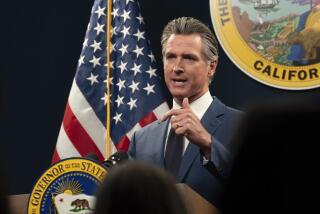Schools Could Suffer in Deukmejian-Honig Spat
- Share via
The rancorous exchange between Gov. George Deukmejian and state Supt. of Public Instruction Bill Honig has politicized the issue of spending for education, and the schools could be the victims of the battle.
For most of his tenure Honig had managed to walk the fine political line of a nonpartisan official while campaigning energetically for improved public schools.
Now the state faces a budget crunch, and Honig is in a political stew. When Deukmejian released his lean 1987-88 budget, proposing to give a 4.2% increase to elementary and secondary schools, Honig’s reaction was angry and public. He promptly labeled the budget “disastrous” for schools, and accused the governor of “misrepresentation” and of violating the state Constitution by using anticipated lottery money for day-to-day school expenses. He promised a statewide campaign to demand more money in the budget, and called for changes in the voter-approved government spending limit that the governor says he supports.
Deukmejian shot back with an uncharacteristically personal attack. He accused Honig of being a “demagogue” and of acting “irresponsibly,” suggesting that anyone who proposed spending more for programs than he had allocated was a “high roller” and a snake-oil salesman.
Each accused the other of fiddling with figures to give a misleading picture of the education budget. Honig claims that Deukmejian’s budget amounts to a cut in real dollars for schools because it would take an additional $600 million to fund existing programs. According to Honig, education will receive only $124 million, or 9%, of the $1.5 billion in new money available for spending next year. Deukmejian maintains that education is still getting the biggest share of the budget, and the governor takes credit for increasing money to schools even when the economy is slow and revenues are down.
Aides to the governor said that they had rarely seen him so angry as when Honig accused him of betraying public schools. Aides to Honig said that he felt personally deceived by Deukmejian because the governor didn’t consult with him about specific program cuts.
But the dispute goes far beyond a disagreement over numbers. Both Honig and Deukmejian breezed into second terms armed, it seemed, with a mandate to carry out the programs that they have been championing over the past four years.
Deukmejian’s fiscally conservative agenda, hinged on maintaining a $1-billion budget reserve without increasing taxes, will be tougher to carry out this year than at any time since the state faced a deficit in 1982. But the governor insists that his reelection mandate is to hold firm to that agenda, even if to do so requires deep budget cuts.
Honig feels every bit as strongly about continuing his agenda of revitalizing public schools--a program dependent on millions of new dollars each year.
The governor has always maintained that his highest priority is education, but believes that when money is as tight as it is now, every program must take its share of the economic beating.
In the past couple of years the state has had enough money to accommodate both men’s programs. The education budget, as well as spending for most other state programs, grew while Deukmejian took credit for holding the line on taxes. Now, although Deukmejian has tried to paint the state’s economy in as rosy terms as possible, revenue shortfalls combined with rising costs for human services leave precious little extra cash to go around.
And it is at such times of financial hardship that differences in politics and policy are brought into sharp relief. By coming out so strongly against the governor, Honig may have left himself open for a retaliation that ultimately will benefit the governor and put some of Honig’s Republican supporters in a tight political spot. Honig’s statewide campaign might succeed in putting pressure on the governor, but it could also harden Deukmejian’s resolve to remain tight-fisted with the budget. Since his first campaign for superintendent, Honig has successfully wooed business leaders --also backers of the governor--to support his back-to-basics school-reform programs. Now he has aligned himself with Democrats who oppose Deukmejian’s budget.
The governor’s verbal lashing of Honig left little doubt about how he would perceive support of Honig’s plan. Honig’s reaction to the budget and his plan to drum up support fueled speculation that he may be preparing for a 1990 run for governor against Deukmejian, should Deukmejian decide to seek a third term.
Honig denies the speculation, but if his dispute with the governor is in fact the start of the next gubernatorial campaign, Deukmejian has won Round 1.
Meanwhile, the discussion of school-funding needs, supposedly the central issue, has been upstaged by the political bickering. Certainly the Honig-Deukmejian standoff will make negotiations over the schools budget tougher for everyone.
More to Read
Sign up for Essential California
The most important California stories and recommendations in your inbox every morning.
You may occasionally receive promotional content from the Los Angeles Times.













